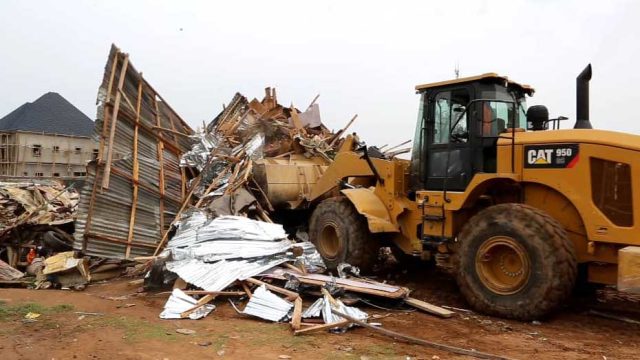The Resource Centre for Human Rights and Civic Education (CHRICED) is seriously disturbed by the alarming trend of widespread destruction of indigenous settlements within the Federal Capital Territory (FCT) of Nigeria. The displacement of the Abuja natives has reached a critical point with the most recent incident involving the Nigerian government’s forcible demolition of more than 200 homes in the Nuwalege Community, located along the Nnamdi Azikiwe International Airport Road, to facilitate the expansion of the presidential air fleet.
This act of demolition is not merely a physical destruction of homes; it represents a profound violation of the fundamental rights of citizens to their ancestral lands. The right to land is deeply intertwined with cultural identity, heritage, and community cohesion, and the actions taken by the government reflect a blatant disregard for these essential rights.
Furthermore, the right to shelter is a basic human right recognized globally, and the forced eviction of residents from their homes undermines their personal dignity and security.The demolition reportedly executed by the Federal Capital Development Authority (FCDA) to accommodate the luxurious lifestyle of the presidency demonstrates gross irresponsibility and insensitive to the plight of the Abuja natives. This prioritization of luxury and expansion for a select few over the basic rights and needs of ordinary citizens is an affront to democratic values and the principles of social justice. It is not only unjust but also raises serious ethical questions about governance and accountability in Nigeria.
CHRICED unequivocally condemns this demolition in its entirety, calling for immediate action to halt further evictions and to protect the rights of the affected communities. The recent demolition, at the behest of Nigeria Air force (NAF), executed without prior notification or compensation, has rendered numerous families homeless and exposed them to significant risks. This situation is intolerable as it violates several key human rights instruments, including Article 14 of The African Charter on Human and Peoples’ Rights, Article 11 of The International Covenant on Economic, Social and Cultural Rights, Article 25 of the Universal Declaration of Human Rights, and the provisions outlined in Chapter 4 of the amended 1999 constitution of the Federal Republic of Nigeria, which asserts that “No one shall be subjected to torture or to cruel, inhuman or degrading treatment or punishment.”
The implications of this demolition extend far beyond the immediate loss of shelter; they strike at the very heart of human dignity and the right to a secure and stable living environment. The affected families, many of whom have lived in these communities for generations, now face the harsh realities of displacement, insecurity, and the potential for further marginalization. The lack of prior notification not only undermines the principles of transparency and accountability but also strips these individuals of their agency, leaving them vulnerable and without recourse.
It is particularly distressing that the affected community predominantly consists of the Abuja Original Inhabitants, whose lands were seized through military fiat over four decades ago with little or no compensation, to facilitate the establishment of Nigeria’s capital territory. This historical context is crucial, as it highlights a pattern of systemic injustice that has persisted over the years. The ongoing practice of forcibly evicting Abuja Original Inhabitant communities from their ancestral lands, without adequate compensation or relocation strategies, not only constitutes a breach of fundamental human rights but akin to a visitor forcefully evicting his host from his own home, as reward for his hospitality.
This analogy starkly illustrates the moral and ethical failures inherent in such actions. The Abuja Original Inhabitants, who have long been the stewards of their land, are being treated as intruders in their own home, a situation that is both unjust and unsustainable. The forced evictions not only disrupt the social fabric of these communities but also threaten their cultural heritage and identity, as the land is inextricably linked to their history and way of life.
Moreover, the lack of adequate relocation strategies exacerbates the situation, as displaced families are often left to fend for themselves in unfamiliar environments, facing challenges such as inadequate access to basic services, healthcare, and education. This further entrenches cycles of poverty and inequality, undermining the very foundations of social justice and human rights that the international community seeks.
Therefore, CHRICED urges the government to immediately engage in meaningful dialogue with the evicted residents of Nuwalege, ensuring that their voices are heard, and their rights are respected. It is imperative that the government recognizes the importance of preserving the cultural and social fabric of these communities, rather than prioritizing development projects that serve the interests of a privileged few at the expense of the many.
CHRICED calls for a comprehensive review of policies related to land use and urban development in the FCT, advocating for a more inclusive approach that respects the rights of indigenous populations and promotes sustainable development that benefits all citizens.
CHRICED demands the immediate lifting of the FCT Minister’s ban concerning customary rights of occupancy, enabling FCT Area Councils to issue these rights within the FCT, and urges the FCT authorities to cease any further appropriation of farmland belonging to Original Inhabitants and the demolition of their homes.
We stand in solidarity with the affected families and community members in Nuwalege in FCT, reaffirming our commitment to upholding human rights, advancing social justice, and advocating for a Nigeria where the rights and dignity of every citizen are respected.
Signed:
Executive Director

